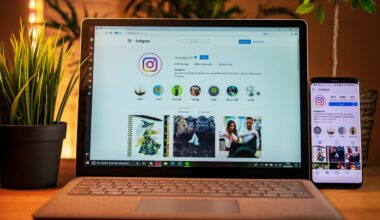Introduction: The Role of Influencers
In today’s social media landscape, influencers play a significant role in shaping public perception during crises. Brands facing backlash or negative publicity often rely on these individuals to help navigate their communication strategy. Leveraging influencers effectively can provide a human face to the brand, which is essential when emotions are running high. Their credibility and established trust with their followers allow them to deliver messages that resonate more deeply than traditional advertisements. This engagement is crucial for any brand looking to mitigate damage during a public relations crisis. By utilizing the right influencers, brands can reclaim their narrative and ensure their message is heard. It’s important to select influencers whose values align with the brand to maintain authenticity. This alignment not only fosters credibility but also enhances the overall effectiveness of the communication strategy, ensuring that followers remain engaged. Properly executed influencer strategy leverages their platforms to transform potential crises into opportunities for dialogue and connection. Influencers can encourage customers to share their own stories, leading to a more human, relatable response from the brand.
Selecting the Right Influencers
The choice of influencer is paramount for effective crisis management in branding. Brands must evaluate potential partners carefully to ensure they fit well with the company’s message and values. Consider the influencer’s follower demographics, engagement rates, and past behaviors during similar events. Successful influencers have established communities that value their opinions, making them powerful allies in times of social media crises. An influencer’s authenticity and credibility should not only align with the brand’s image but also resonate with its target audience. Additionally, it’s crucial to analyze the influencer’s prior interactions with the brand, ensuring consistency. Engaging micro-influencers can also be beneficial. These individuals typically have more focused niches and often enjoy heightened engagement compared to more prominent personalities. Furthermore, crisis scenarios vary greatly, so selecting influencers with proven crisis management skills can enhance messaging effectiveness. Lastly, contingency plans should be in place in case the selected influencers do not receive the expected response or cause further issues. This proactive approach ensures that brands are prepared to adapt their strategies as required, maximizing their potential for restoring brand credibility.
Involving influencers in crisis communication allows real-time responses to public sentiment. Social media platforms have made it easier for audiences to express their feelings, and influencers can act as intermediaries between the brand and consumers. They can help convey apologies, next steps, or positive actions being taken to rectify the situation. Their ability to frame communications in a relatable way can soften public backlash and help shift the narrative. Equipped with a robust following and direct lines of communication with their audience, influencers can quickly disseminate important information. This immediate feedback loop allows brands to gauge public sentiment faster than traditional methods. However, influencers must be well-versed in the crisis at hand and the brand’s response strategy. Providing influencers with the right messaging and training is essential to ensure they convey the intended message effectively. Miscommunication can worsen a situation, thus, clear directives and ongoing support are critical. As crises often escalate on social media, timely responses can make all the difference in bridging the gap between the brand and its audience, thereby restoring trust and credibility.
Creating Authentic Messages
Authenticity is key to effective influencer-led messaging. During a crisis, transparency often resonates more than any other marketing strategy. Brands should empower their influencers to share personalized stories or insights that reflect the ongoing situation. These narratives can humanize the brand, making the overall communication more relatable to the audience. Consumers appreciate genuine messages rather than scripted or overly polished responses. This sincerity fosters trust and encourages open dialogue. Also, influencer storytelling can bring additional context to the brand’s actions during a crisis, framing it in a manner that encourages understanding and empathy from the audience. When influencers share their thoughts, thoughts that mirror the general public sentiment, it aids in alleviating tensions surrounding backlash. Collaboratively developing content that aligns with the brand’s objectives and resonates emotionally will engage followers on a deeper level. Furthermore, utilizing multimedia formats like videos or live streams can increase engagement rates. By fully embracing the power of storytelling during crises, brands can turn potentially detrimental situations into opportunities for growth and stronger relationships.
Influencers’ networks can also amplify a brand’s crisis messaging exponentially. When a potential crisis hits, having prepared influencers can lead to rapid cascading responses across social media. Often, one influential post can trigger a wave of supportive conversations which makes community engagement genuine and more substantial. Additionally, these influencers can engage directly with followers who express concerns, thus ensuring clear communication lines are maintained. The power of community can be harnessed through influencers who, while addressing issues, can foster understanding and positivity around the brand. Brands should also encourage influencers to facilitate discussions that gather feedback and suggestions from their audience. This approach not only shows responsiveness but also creates a collaborative environment, assisting in rebuilding the brand image. Moreover, real-time updates from influencers can help manage misinformation that occurs during crises. Authentic influencer interactions not only help extend the lifespan of brand messaging but also solidify the influencer’s position as a trusted source. This is especially important as societal trust in traditional media declines, making influencer credibility even more potent.
Measuring Success and Adjusting Strategies
Post-crisis evaluation is vital to assess the effectiveness of influencer strategies. Monitoring engagement metrics such as comments, shares, likes, and sentiment allows brands to understand the impact of their crisis communications. Assessing the influencer messages’ reach and real-time analytics provides insights that can guide future strategies. Brands should look for qualitative feedback as well; analyzing audience responses can provide deeper understanding and context behind the metrics. Influencer partnerships should be assessed not only on immediate outcomes but also long-term impact on brand equity. By keeping a finger on the pulse of social conversations regarding the brand, companies can pinpoint areas of concern or improvement, ultimately fostering resilience. Additionally, it’s important to use insights from the post-crisis evaluation to refine influencer protocols and practice. Armed with these learnings, brands can build a robust crisis communications plan that includes actionable strategies for influencer engagement. Regular training sessions with influencers can also prepare them to address any potential future issues effectively.
Ultimately, leveraging influencers for crisis management in branding is about building trust. When brands face crises, the response can make or break a reputation, emphasizing the importance of authenticity, messaging, and timely engagement. Utilizing influencers allows brands to pivot their communication strategies in real-time while accessing their massive networks for support and understanding. Brands that embrace a collaborative spirit during crises can restore their image much faster, turning potential public relations disasters into opportunities for growth and connection. Investing resources in nurturing strong relationships with trusted influencers pays off when crises hit, as their voice can often resonate much more with audiences than a corporate statement. The digital landscape requires brands to be nimble and adaptable; leveraging influencers to help co-create responses ensures they remain relevant and in touch with their audiences. Through these relationships, brands can emerge from crisis communications with renewed credibility and a deeper understanding of their consumers’ needs. Influencer collaboration in crisis branding strategies will transform how brands interact with their audiences and address potential crises moving forward.
Conclusion: The Future of Influencer-led Crisis Management
The evolving digital landscape continues to shape how brands manage crises. As social media grows more intertwined with everyday life, the role of influencers will likely expand. Brands that recognize and harness the power of influencers during crises may lead the charge toward innovative communication strategies. Future studies will focus more on understanding demographic shifts and influencer engagement, meaning brands must adapt and stay ahead. Proactively training influencers and fostering strong relationships will position brands to respond effectively amidst challenges. Changing demographics create diverse challenges that require unique approaches. Understanding cultural nuances and expectations can improve brand responsiveness and sensitivity to audience needs. Moreover, brands should recognize the value of building a diverse and inclusive influencer network to reflect their consumer base. This inclusivity will enhance messaging authenticity during crises, as more voices contribute to the narrative. By fostering synergy between the influencers, brands can create a multifaceted approach that addresses consumer concerns on multiple levels. In conclusion, leveraging influencers in crisis communication is essential for modern branding, making it a crucial component for strategic success.


